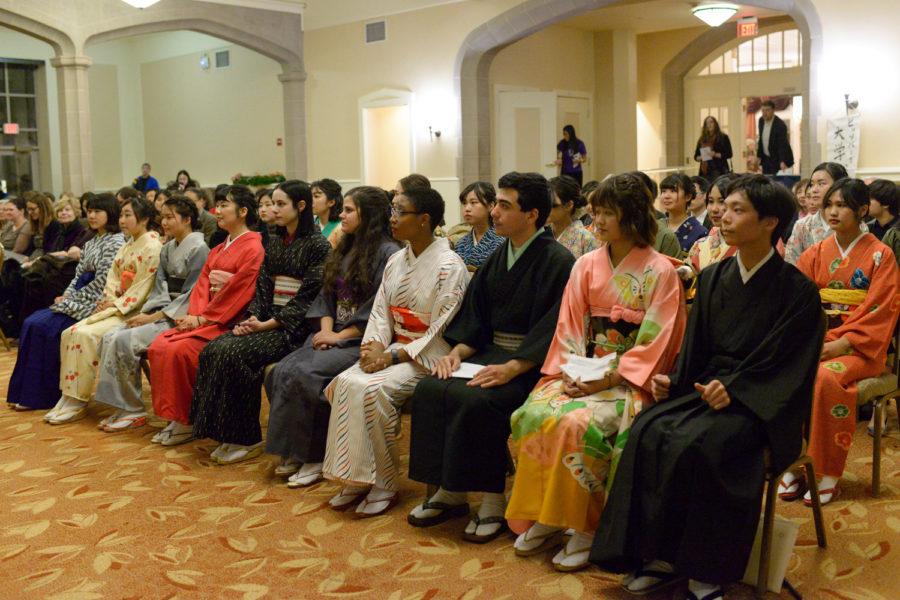Local and international students celebrate Japanese coming of age
Wenhao Wu | Senior Staff Photographer
Students from Yasuda Women’s University and University of Pittsburgh take their seats before Friday afternoon’s Coming of Age Day ceremony.
January 15, 2019
The University Club Ballroom A shook with excitement as Pittsburgh Taiko — a local Japanese percussion ensemble — opened up Friday evening’s Japanese Coming of Age ceremony with a thundering drum performance.
Thirty-four students from both Yasuda Women’s University in Hiroshima, Japan, and the University of Pittsburgh proceeded down the aisle and took their seats in anticipation of the coming ceremony. The students from Yasuda Women’s University are international guests to the University, studying English at Pitt. Most of the female participants were clad in floor-length kimonos patterned with stripes, pastels and bright florals. The kimonos were provided by The Japan-America Society of Pennsylvania, the Japanese Nationality Room Committee and other groups that supported the event.
The Coming of Age ceremony — or Seijin Shiki — celebrates Japanese youth growing into mature adults at the age of 20. Also called “Adult’s Day,” it is a holiday that was established following World War II to create a symbolic cultural rebirth. Because such an effort is put into hairstyles, elaborate clothing and makeup, many photographers and news crews come to cover the event.
As part of the welcome speeches, Dr. Belkys Torres, the executive director for global engagement for the University Center for International Studies, addressed the value of the ceremony and thanked the students for sharing their cultures during Pitt’s Year of Global.
“Thank you all for making our campus and our City a more a creative and interesting place just because you are in it. And thank you for sharing your stories, your history and your expertise with our students, our faculty and staff and community members,” Torres said.
This year marks the second time Pitt has hosted the Coming of Age ceremony, with the first being in 2018. The ceremony was sponsored by UCIS, the English Language Institute, and the Asian Studies Center. Pitt, through the Sakura Project, planted a cherry tree in North Park like it did the previous year as a gift to the students. Along with that, the participants received Pitt-engraved chopsticks and photo ops with Roc.
Mai Takamoto from Yasuda University gave an address following the presentation of gifts. She talked about her experience at Pitt.
“When I first arrived, it was hard for me to make friends. I realized that if I wanted to make friends, I had to jump in conversations,” she said.
Takamoto didn’t want to waste any time, so she participated in many different activities offered through the University.
“I also took my time while in Pittsburgh to visit many museums. I shared my culture with friends, students and my homestay family. All of these things were a part of my growing up, becoming more independent and becoming more outgoing,” Takamoto said. “In my time in Pittsburgh, I have grown up and coincidentally I am now celebrating the Japanese Coming of Age Day ceremony here at Pitt, with my friends, with my classmates and all of you.”
Takamoto continued, explaining the Coming of Age Day ceremony. It is celebrated every year on the second Monday of January and is usually held at local government offices. Every child who turned 20 years old in the previous year is invited to the ceremony. The day is an important rite of passage for young Japanese people in a spiritual sense as well, as they and their families will go to their local shrines and pray for health and success. It is also an expensive day, especially for the young women, due to the ornate traditional clothing they are expected to wear.
“At the Coming of Age Day ceremony, nearly all the young women wear a furisode, a long-sleeved kimono,” Takamoto said, gesturing to her own furisode, which had a bright pink base with blues and yellows in floral and butterfly patterns. “Men, on the other hand, usually wear Western-style formal wear, but some decide to wear traditional kimono.”
Though the event was packed with young women wearing colorful garments, there were some men in attendance wearing their formal clothing and kimonos.
Oliver Jia, a senior Japanese major at Pitt, was one of the few boys in attendance who wore a traditional dark-colored kimono. Jia followed Takamoto and made his speech almost entirely in Japanese, save for an opening sentence thanking both Japanese speakers and non-Japanese speakers for patiently waiting through it.
Jia, along with his five years of studying the language, spent 15 months studying abroad in Japan. He plans on attending graduate school for international relations and is in the middle of applying to schools in Japan.
“Basically [my speech] was saying how my experience studying abroad parallels theirs studying here as students in America,” he said. “The theme is bravery, courage to try new things and making new connections. It also ties into adulthood, which connects with the Coming of Age ceremony.”
The ceremony finished with Brandon Yee, a senior Chinese major and member of the Pitt Calligraphy Club, demonstrating traditional Japanese calligraphy. As he knelt on the stage before a long white sheet of paper, Pittsburgh Taiko provided another rousing drum piece. Yee’s finished piece echoed the sentiments shared through the entire evening. He read the words he wrote in bold black ink aloud to conclude the event.
“Congratulations to the new adults,” Yee said.








